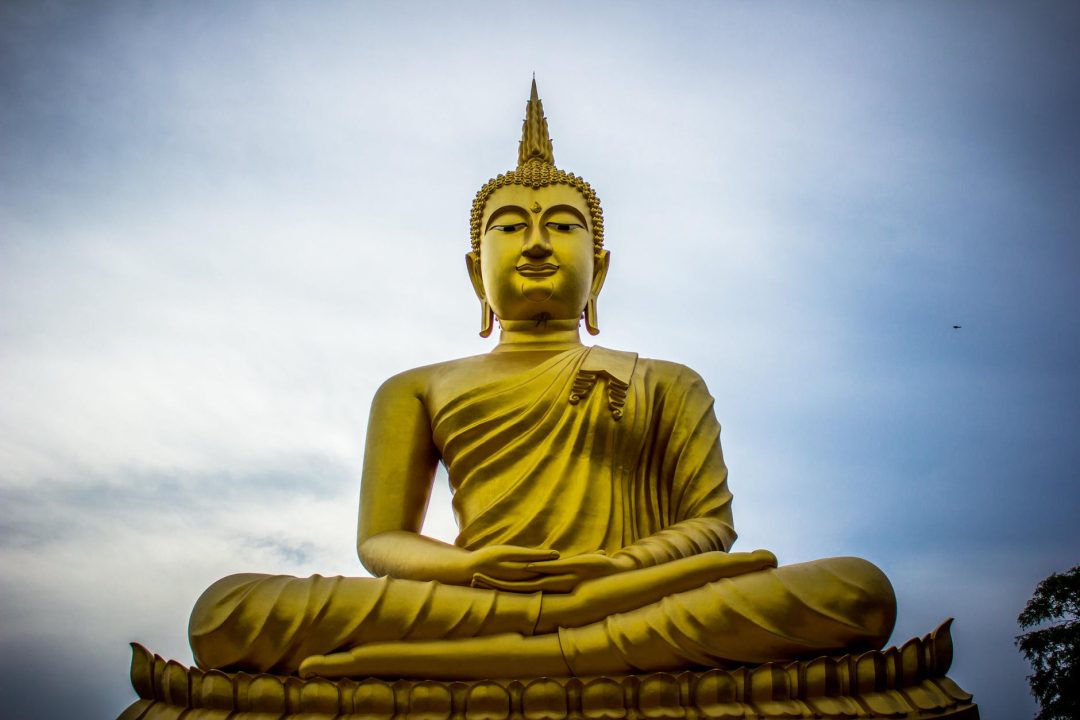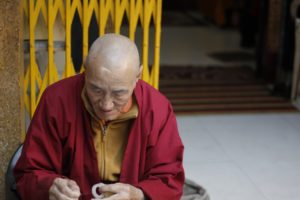Buddhism entered the world 500 years before Christianity. Siddhartha Gautama, the Buddha, was born in what is now Southern Nepal to Queen Mahamaya and King Suddhana. Queen Mahamaya had a dream that a great royal soul would be born to her. She lay under a tree where a while elephant walked around her three times and then entered her womb. She gave birth to her holy son while standing up. Siddhartha was born upright and able to take seven steps upon birth. He also spoke; “I am born for enlightenment. This is my last birth in the world of Phenomena”.
At age 29 Siddhartha left his home to find a cure for the suffering in the world. He renounced all of his power and gave up his earthly possessions to seek salvation and find a cure for the harsh world he lived in. He wandered around as an ascetic, one who gives up earthly desires, for six years. He fasted to conquer the desires of the flesh. When he almost died of starvation, he realized that physical deprivation was not the way to find spiritual peace. He went to a place called the “enlightened place” to meditate all night long and it was there that he became Buddha, meaning “enlightened one”.
The path of the Buddha
The path of the Buddha is to find freedom from the constraints of the world, to find peace from within, and to live a spiritual life through meditation. Through meditation, spiritual wisdom and strength are gained. Desires of the flesh must be relinquished or the wisdom will be lost.
Buddhists believed that they have many lives.
They are on a quest for nirvana, the final state of a Buddha, leaving him free from suffering. Nirvana is the ultimate goal of all Buddhists. It breaks the re-birth cycle called samsara, meaning perpetual wandering, and refers to the journey of the soul through many lives. The Buddha even believes that gods can die and be replaced by other gods. Nirvana is the final resting-place for the Buddha.
The Buddha must completely relinquish all fleshly desires to reach Nirvana, once he has reached Nirvana he can rest and be at peace.
Buddhism compares to other religious belief systems such as Judaism, Christianity, Islam, Buddhism, Hinduism, and Confucianism in several ways. In all belief systems, the believer follows a God, gods or someone who is considered holy. The believer must make sacrifices to enter the final resting-place and be at peace. The believer must meditate or pray to gain inner strength. They must live a decent, moral life, free of sin to enter the final resting-place. All of these belief systems compare to Taoism and Zoroastrianism because all of the belief systems are a state of mind and of being. They are all seeking eternal peace and moral fortitude.
All civilizations are shaped by their belief system.
If people believe in God or gods, and eternal damnation, society will be better for it. Belief in God or gods and their authority over society as a whole requires people to have morals. If a society is anti-moral and allows an “anything goes” attitude, the society will certainly fail. Buddhism, Christianity, Islam, Hinduism, and Confucianism have thrived for so many years because of the belief in God or gods who expect them to have morals before they can have eternal peace and life which has kept the belief system moral and strong.
References:
Lowenstein, T. (1996). The Vision of Buddha. London.






